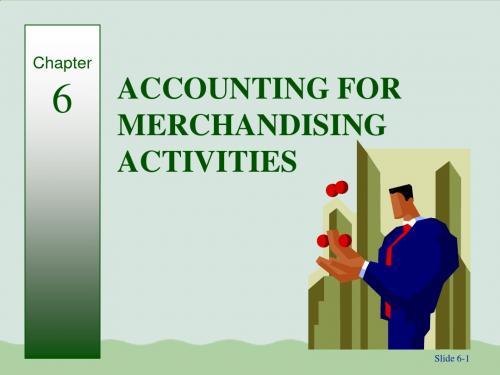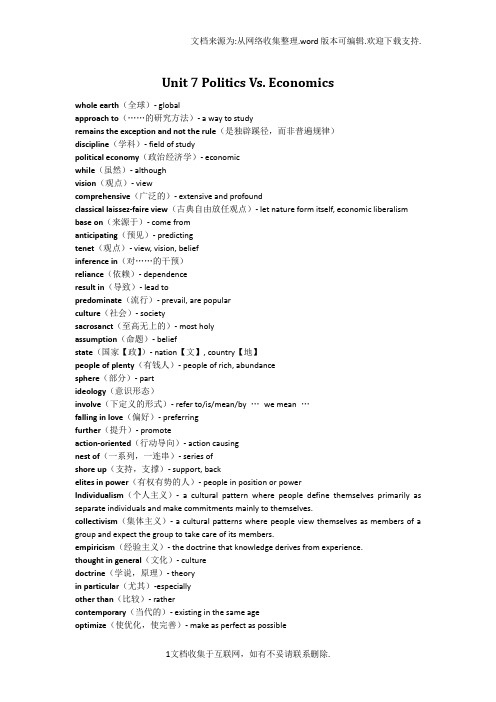对外经济贸易大学专业英语资料共28页
对外经贸会计专业相关资料(英文版)ppt(共82页)

Purchase inventory in ready-to-sell condition.
Manufacture inventory and have a longer
and more complex operating cycle
Merchandising Company
Manufacturing Company
Special Reporting Requirements
• Customer Ledgers
•Tax Reports
Slide 6-6
General Ledger Accounts
Although general ledger accounts provide useful information, they do not provide
Slide 6-9
Subsidiary Ledgers
Accounts receivable ledger
Name: ___________________________________________ Address: _________________________________________
15
3,000 7,000
Who owes us money?
Slide 6-7
Subsidiary Ledgers 明细分类账: A Source of Needed Details
Controlling Account
General Ledger Accounts Receivable
统制账户
SlideБайду номын сангаас6-4
Income Statement of a Merchandising Company
国际贸易专业英语讲解材料

• DAT (Delivered at Terminal and Unloaded): The seller fulfills the obligation to deliver when the goods are placed at the disposal of the buyer on the agreed delivery platform and unloaded The seller bears all risks of loss of or damage to the goods until they are delivered and unloaded
• DPU (Delivered at Place Unloaded): The seller fulfills the opposition to deliver when the goods are placed at the disposal of the buyer at the agreed destination and unloaded The seller bears all risks of loss of or damage to the goods until they are delivered and unloaded
对外经济贸易大学金融学院金融专业英语试题

对外经济贸易大学2002年攻读硕士学位研究生入学考试金融学院金融专业英语试题(英译中,五段,每段20分,共100分)1.What is a bank?As important as banks are to the economy as a whole and to local communities, there is much confusion about exactly what a bank is. Certainly banks can be identified by the functions (services or roles) they perform in the economy. The problem is that not only are the functions of banks changing, but the functions of their principal competitors are changing as well. Indeed, many financial institutions including leading security dealers, brokerage firms, mutual funds, and insurance companies arc trying to be as similar as possible to banks in the services they offer. Bankers, in turn, are challenging these nonblank competitors by lobbying for expanded authority to offer real estate and full-service security brokerage, insurance coverage, investments in mutual funds, and many other new services.As important as banks are to the economy as a whole and to local communities, there is much confusion about exactly what a bank is. Certainly banks can be identified by the functions (services or roles) they perform in the economy. The problem is that not only are the functions of banks changing, but the functions of their principal competitors are changing as well. Indeed, many financial institutions including leading security dealers, brokerage firms, mutual funds, and insurance companies arc trying to be as similar as possible to banks in the services they offer. Bankers, in turn, are challenging these nonblank competitors by lobbying for expanded authority to offer real estate and full-service security brokerage, insurance coverage, investments in mutual funds, and many other new services.The result of many legal and regulatory changes is a state of confusion in the public’s mind today over what is or is not a bank. The safest approach is probably to view these institutions in terms of what types of services the offer the public. Banks are those financial institutions that offer the widest range of financial services especially credit, savings, and payment services and perform the widest range of financial functions of any business form in the economy. This multiplicity of bank services and functions has led to banks being labeled“financial department store”.2. The Adoption of Indirect Instruments of Monetary PolicyIn the late 1970s, industrial countries began phasing out the direct instruments some of them used to operate monetary policy-including credits controls, interest rate ceilings, and sometimes directed credits-and began moving toward full reliance on indirect instruments, such as open market operations, rediscount facilities, and reserve requirement. In more recent years, there has been also an increasing tendency for the developing countries and the economies in transition to adopt such instruments.The greater use of indirect monetary instruments can be seen as the counterpart in the monetary area to the widespread movement toward enhancing the role of price signals in the economy more generally. Both have the same objective of improving market efficiency. Perhaps even more critically, moves to indirect instruments are taking place in an increasingly more open economic environment, with widespread adoption of current account convertibility. In such an environment, direct instruments have become increasingly ineffective, leading to inefficiencies and disintermediation. In the absence of indirect instruments of monetary policy, the authoritieswould, therefore, be unable to counter any problems of excess liquidity, which would impede their efforts to stabilize the economy.3. Why banks are so heavily regulated?Why are banks so closely regulated? There are number of reasons for this heavy burden of government supervision, some of them centuries old.First, banks are among the leasing repositories of the public’s savings especially the saving of individuals and families. While most of the public’s saving are placed in relatively short-term, highly liquid deposits, banks also hold large amounts of long-term savings in individual retirement accounts (IRAs). The loss of these funds due to bank failure or bank crime would be catastrophic to many individuals and families. But, many savers lack the financial expertise and depth of information needed to correctly evaluate the riskiness of a bank. Therefore, regulatory agencies are charged with the responsibility of gathering and evaluating the information needed to assess the true financial condition of banks in order to protect the public against loss.Banks are also closely watched because of their power to create money in the form of readily spendable deposits by making loans and investments. Changes in the volume of money created by banks appear to be closely correlated with economic conditions, especially the growth of jobs and the presence or absence of inflation.Banks are also regulated because they provide individuals and businesses with loans that support consumption and investment spending. Regulatory authorities argue that the public has a keen interest in an adequate supply of loans flowing from the banking system. Moreover, where discrimination in the granting of credit is present, those individuals who are discriminated against face a significant obstacle to their personal well-being and an improved standard of living. This is especially true if access to credit is denied because of age, sex, race, national origin, or similar factors.Finally, banks have a long history of involvement with government federal, state, and local. Early in the history of the industry governments relied upon cheap bank credit and the taxation of banks to finance armies and to supply the funds they were unwilling to raise through direct taxation of their citizens. More recently, governments have relied upon banks to assist in conducting economic policy, in collecting taxes, and in dispensing government payments.4. Financial FuturesA financial futures contract is an agreement between buyer and a seller reached today that calls for the delivery of particular security in exchange for cash at some future date . The market value of a futures contract changes daily as the market price of the security to be exchanged moves over time. As a result, futures contracts are “marked to marker”each day to reflect the current value of the assets subject to eventual delivery under each futures contract, and a cash payment may have to be made (usually to a broker) by one or the other party to the contract in order to protect against possible loss.The financial futures markets are designed to shift the risk of interest rate fluctuations from risk-averse investors, such as commercial banks, to speculators willing to accept and possibly profit from such risks. Futures contracts are traded on organized exchanges (such as the Chicago Board of Trade or the London Futures Exchange), where floor brokers execute orders received from the public to buy or sell these contracts at the best prices available. Then a bank contacts an exchange broker and offers to sell futures contracts (I, e., the bank wishers to “go short”in futures), this means it is promising to deliver securities of a certain kind and quality to the buyerof those contracts on a stipulated date at a predetermined price. Conversely, a bank may enter the futures market as buyer of futures contracts (i.e., the bank chooses to “go long”in futures), agreeing to accept delivery of the particular securities named in each contract and to pay cash to the exchange clearinghouse the day the contracts mature, based on their price at that time.5. Offshore Financial Center (OFC)An offshore financial center (OFC) may be defined as jurisdiction in which transactions with non-residents far outweigh transactions related to the domestic economy. They have developed by offering an attractive tax, legal and/or regulatory environment. In particular, the absence of inheritance, wealth, withholding or capital gains taxes can make the environment in OFCs very favorable to, for example, internationally mobile individuals. Zero or low direct taxes can make it attractive for companies conducting business with non-residents to incorporate in OFCs. Ina similar vein, the corporate legal environment may facilitate speedy adoption of new financial products or allow greater flexibility in restructuring and refinancing options. Political and economic stability and the presence of high quality professional (eg legal and accounting) and supporting services are also important in attracting business from other major financial centers.A number of important OFCs are small island states, with few domestically owned financial institutions, a large number of “brass-plate” institutions and little non-financial economic activity. The Cayman Islands and the British Virgin Islands are obvious examples. But the distinction between OFCs and other financial centers is not clear-out. Some economies. Such as Hong Kong and Singapore have a significant volume of entrepot business alongside domestically orientated financial intermediation. The term “OTC”is , furthermore, sometimes also used in connection with special tax and/or regulation zones that are established within the borders of a country to attract non-resident business (for example Labuan in Malaysia, or the International Financial Services Center in Dublin).1.银行是什么?无论是对于整个经济还是对于某一地区的经济而言,银行都是很重要的,同样地,人们对银行的准确含义也充满了困惑。
商务英语阅读课件 对外经济贸易大学

Discussion
Can you list the names of the EU’s various institutions mentioned in this text? What are they?
What does “institutional-complexity issue” refer to? Summarize EU’s self-imposed obstacles which may block the summit from being a success.
Background Information
Of course, there are trading blocks with no trade barriers at all such as the single market of the European Union. The North American Free Trade Organization, or NAFA (the US, Canada and Mexico) is also eliminating its tariffs and customs duties. Their equivalents in Asia and Latin America are ASEAN and MERCOSUR.
and free trade, open borders and deregulation now form the ideal for almost all nations, even if the situation is far from one of complete laisser-faire, with no government intervention.
外经贸英语资料整理.doc(精)

国际货代专业词汇解析(整理常见报关随附单证上的中英文对照表(外销员辅导发票invoice单价unit price合同contract CONT总额amount AMT货物描述description goods总价total amout型号model件数packages PKGS尺寸size毛重gross weight G.W数量quantity净重net weight N.W原产国made in / origin保险费insurance装货港port of loading P.O.L杂费extras .目的国destination country佣金commission指运港port of destination P.O.D.折扣rebate/allowance .运费freight装箱单packing list净重net weight N.W.件数packages PKGS所附单证documents attached DOC.ATT 毛重gross weight G.W/GR.WT单证documents DOC(S提单bill of loading托运人shipper承运人carrier被通知人notify party收货人consignee停靠港port of call P.O.C.空运提单air way bill A.W.B.卸货港port of discharge P.O.D.空运提单air freight bill A.F.B.转运港port of transfer P.O.L.原产国made in / origin /m经过via船名及航次ocean vessel voy.no.转运到intransit to到达港port of arrival P.A指运港port of destination P.O.D物流货运费英文术语大全(外销员辅导海运费ocean freight 集卡运费、短驳费Drayage订舱费booking charge报关费customs clearance fee操作劳务费labour fee or handling charge商检换单费exchange fee for CIP换单费D/O fee拆箱费De-vanning charge港杂费port sur-charge电放费B/L surrender fee冲关费emergent declearation change海关查验费customs inspection fee待时费waiting charge仓储费storage fee改单费amendment charge拼箱服务费LCL service charge动、植检疫费animal & plant quarantine fee 移动式其重机费mobile crane charge进出库费warehouse in/out charge提箱费container stuffing charge滞期费demurrage charge滞箱费container detention charge卡车运费cartage fee商检费commodity inspection fee转运费transportation charge污箱费container dirtyness change坏箱费用container damage charge清洁箱费container clearance charge分拨费dispatch charge车上交货FOT ( free on track电汇手续费T/T fee转境费/过境费I/E bonded charge空运方面的专用术语空运费air freight机场费air terminal charge空运提单费airway bill feeFSC (燃油附加费 fuel surchargeSCC(安全附加费securitysur-charge抽单费D/O fee上海港常用术语内装箱费container loading charge(including inland drayage疏港费port congestion charge他港常用术语场站费CFS charge文件费document chargeAMS Automated Manifest System 自运舱单系统ACS/ACC ALAMEDA CORRIDOR SURCHARGE 火车通道费(自洛杉矶转运BAF BUNKER AJUSTMENT FACTOR 燃油附加费系数BAF 燃油附加费,大多数航线都有,但标准不一。
国贸专业英语

出口补贴 反倾销 保税区 保税仓库 出口加工区 最惠国待遇 国民待遇
Export subsidy Anti-dumping Bonded area Bonded warehouse Export processing zone Most-favored-nation treatment National treatment
bjfzxybasicwords?国际贸易?对外贸易?进口?出口?发达国家?发展中国家?最不发达国家?internationaltrade?foreigntrade?import?export?developedcountry?developingcountry?leastdevelopedcountryldcbasicwords?初级产品?工业制成品?资本?耐用消费品?工业革命?国际分工?专业化?primaryproducts?manufacturedgoods?capital?durableconsumergoods?industrialrevolution?internationaldivisionoflabor?specializationbasicwords?双边贸易?多边贸易?贸易差额?贸易顺差?贸易逆差?比较优势?要素禀赋?bilateraltrade?multilateraltrade?balanceoftrade?tradesurplus?tradedeficit?comparativeadvantage?factorendowmentbasicwords?垄断?拍卖?招标?参考价格?保护主义?贸易自由化?禁运?monopoly?auction?tender?referenceprice?protectionism?tradeliberalization?embargobasicwords?出口补贴?反倾销?保税区?保税仓库?出口加工区?最惠国待遇?国民待遇?exportsubsidy?antidumping?bondedarea?bondedwarehouse?exportprocessingzone?mostfavorednationtreatment?nationaltreatmentbasicwords?边境?海关?关税?非关税壁垒?配额?许可证?外汇?frontier?customs?tariffcustomsduty?nontariffbarrier?quota?license?foreignexchangebasicwords?世界贸易组织?关贸总协定?贸易谈判?可持续发展?公平竞争?市场准入?原产地规则?worldtradeorganizationwto?generalagreementontariffandtradegatt?tradenegotiation?sustainab
大学外贸英语资料整理新

大学外贸英语资料整理词汇1. opportunity cost 机会成本2. Trade balance 贸易差额3. PPF 生产可能性边界4. Productivity 生产率5.factor endowment 要素禀赋6. Competitive advantage 比较优势7. Economies of scale 规模经济8. National income 国民收入9. Infant industry 幼稚产业10. VER 自愿出口限制11. Dumping 倾销12. Specific tariff 从量税13. d valorem tariff 从价税14. Punitive tariff 惩罚性关税15. Local content requirement 本地成分要求16. Import quota 进口份额17. Administrative policies 行政政策Chapter4I. Answer the following questions:1.What are the chief benefits from international trade?1) Helping to raise the living standards of the people2) Helping to upgrade a country’s modernization3) Helping to solve a country’s shortage of capital4) Helping to solve unemployment problems5) Helping to promote mutual understanding and friendship between trading6) Helping to boost a country’s competitiveness in the world market7) Helping a country to accelerate its overall economic growth2.Give examples to show that no country is able to produce everything it needs。
Unit_7_Politics_Vs._Economics对外经贸大学金融英语知识点总结

Unit 7 Politics Vs. Economicswhole earth(全球)- globalapproach to(……的研究方法)- a way to studyremains the exception and not the rule(是独辟蹊径,而非普遍规律)discipline(学科)- field of studypolitical economy(政治经济学)- economicwhile(虽然)- althoughvision(观点)- viewcomprehensive(广泛的)- extensive and profoundclassical laissez-faire view(古典自由放任观点)- let nature form itself, economic liberalism base on(来源于)- come fromanticipating(预见)- predictingtenet(观点)- view, vision, beliefinference in(对……的干预)reliance(依赖)- dependenceresult in(导致)- lead topredominate(流行)- prevail, are popularculture(社会)- societysacrosanct(至高无上的)- most holyassumption(命题)- beliefstate(国家【政】)- nation【文】, country【地】people of plenty(有钱人)- people of rich, abundancesphere(部分)- partideology(意识形态)involve(下定义的形式)- refer to/is/mean/by …we mean …falling in love(偏好)- preferringfurther(提升)- promoteaction-oriented(行动导向)- action causingnest of(一系列,一连串)- series ofshore up(支持,支撑)- support, backelites in power(有权有势的人)- people in position or powerIndividualism(个人主义)- a cultural pattern where people define themselves primarily as separate individuals and make commitments mainly to themselves.collectivism(集体主义)- a cultural patterns where people view themselves as members of a group and expect the group to take care of its members.empiricism(经验主义)- the doctrine that knowledge derives from experience.thought in general(文化)- culturedoctrine(学说,原理)- theoryin particular(尤其)-especiallyother than(比较)- rathercontemporary(当代的)- existing in the same ageoptimize(使优化,使完善)- make as perfect as possiblealready exist(现存,事实)- realityengines of motivation behind(……的驱动力)- driving forces ofideas(条件)- conditionsroot in(基于,来源于)- base frompriorities(优先权)- status established in order of importance or urgencydeepen(增长)- increasetherapy for(……的解决办法)- solution tocapital investment(资本投资)- public works financed by the governmentin bad times(萧条之时)- in tough times, in hard timesintervene(干涉,干预)- interferein boom times(繁荣之时)- in good timescool down(减慢)- slow downtighten up(收紧)- reduce, decreaseausterity measure(紧缩政策)- policy aimed at a severe rigid economy by cutting down on government spending while raising interest rate and taxes.prescription(方法)- methoddominate(占领)- take controlregime(政体,政府)- administrationPax Britainnica(英国统治下的和平)- peace under the rule of the Britishcompatibility(不谋而合)- share the same opinionno accident(绝非偶然)- inevitablehegemony(霸权)- powerful dominationepitomize(表现在)- demonstrate/show/reflectenforce(执行,实施)- carry outfeudal age(封建时期)reaction(反抗,反应)- strugglerebellion against(反抗)- reaction/struggle againstrugged(粗糙)- lacking polish, roughrendering(表现,表达)- expressingrigid(教条)- not flexibledogmatic(教条)- rigid, not flexibledefine A as B(将A定义为B)much less(还不至于)- not to the extent ofincomprehensible(不可理喻的)- not able to be understoodanathema(强烈的不喜欢)- sth. strongly dislikedin terms of(在……方面)- from the perspective ofperceive(感觉,感知)- to be aware of, to regardincorporation(组合,联合)- combinationself-serving(自私【书】)- selfish, egoistic, self-centered, self-orientedestablished Western nations(西方列强)- powerful Western nationstake for granted(视之理所当然)- accept without proper appreciationprime(精华)- bestreal estate(房地产)- landdoctrine(理论)- theoryadvocate(拥护,支持)- supportfocused upon, … not upon(强调)- emphasisstatus quo(现状)- currentradical(全部)- entire, wholereciprocity(互惠主义)- the state of mutual benefitstakes(原料)- resourcescomparative advantages(比较优势,相对优势)- an economic theory that a country has the ability to produce a homogeneous good or service at a lower opportunity cost relative to another country.permit for(考虑,想到)- considerguaranteeing(导致)- resulting in, leading to, bringing outprimacy(重要性)- importancelogic(逻辑)- conceptasymmetry(不对称)- a lack of symmetryaccelerate(加速)- speed uptempo(节奏)- pacethe haves(有钱人)- the richthose with property(富国)- wealth nationstransformation(变化)- gradual changecontract(变小)- narrowdropping(没落)- ending, termination, collapsequadruple(四倍增长)- increase by 4 timesOrganization of Petroleum Exporting Countries(OPEC)石油输出国组织in global terms(从国际角度)- from the global perspectivesensibility(感悟)- ability to respectno-nonsense(真实的)- true, realdisenchantment(觉醒)- freedom from illusionperforated(饱受)- badly hurt, wounded, traumatizedimportant(无能的)- incapableconglomerate(企业集团)- multinational enterprisemiseducated(教坏)-misleadproliferation(加速)- accelerateundigested(未解决的)- unsolvedsplit(裂缝)- gapspread(差别)- differencehave yet to do(没有经验)- have no experience yetecology(生态)- environmental protectionpreoccupation(最重要的事物)- priority, most important thingtrophy(战利品)apolitical management(无政府管理)maintenance base(休养地,生活港湾)- safe homeprerequisite to(先决条件)- precondition forgo to the point of closure of sb.(我的观点并不意味着推翻某人观点)- does not mean to terminate the view point of sb.envision(预想)- foreseediffuse(模糊)- vague, not clearcoterminous(并不等同于,相连的)- equivalent toanticipation(预感)- predictiondiscrete(不同)- different英译汉The pragmatic individualism and empiricism of Anglo-Saxon though in general and of Adam Smith’s classical liberal doctrine of maximizing self-interest in particular served as preconditions for the birth of the Industrial Revolution in Britain.在盎格鲁- 撒克逊文化中,尤其是亚当·斯密关于私立最大化的经典自由主义学说中所体现的实用个人主义和经验主义,成为了催生英国工业革命的先决条件。
